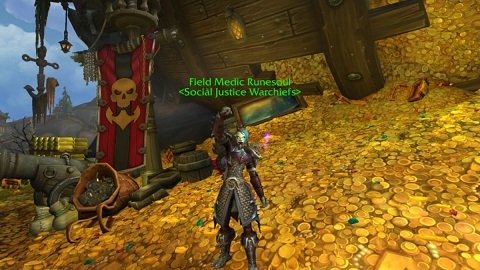
The Original Gangster Goblin Town
I have always been fascinated with video game economies, especially those that mimic economies within the real world. WOW was one of the first games to accomplish this on a scale previously thought impossible. The success of that game opened the doors for Massively Multiplayer Online RPG games in a big way.
I've recently written a couple posts about the Diablo IV beta and subsequent release in June. The game itself looks promising, but I'm not particularly excited about it... at least not on the same level that I normally would be. Is this because I'm a jaded middle-aged millennial watching humanity itself sprint towards the edge of a metaphorical cliff? Maybe, but I'd like to think it's because centralized WEB2-style games just aren't my thing anymore.
To be fair WEB3 games aren't my thing either.
I've yet to see a player-owned player-built WEB3 game, which is certainly what I'm looking for. 99% of the crypto space is rampant greed full of WEB1 logic, so that's disappointing. Soon™
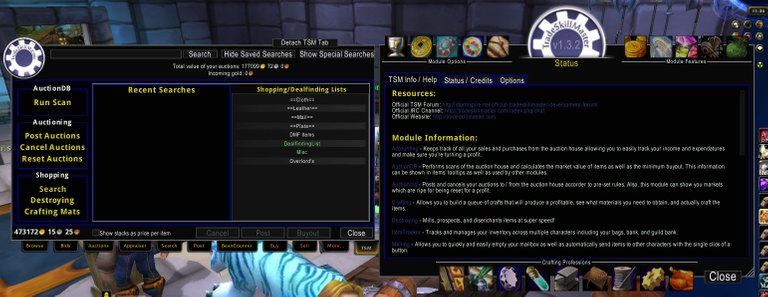
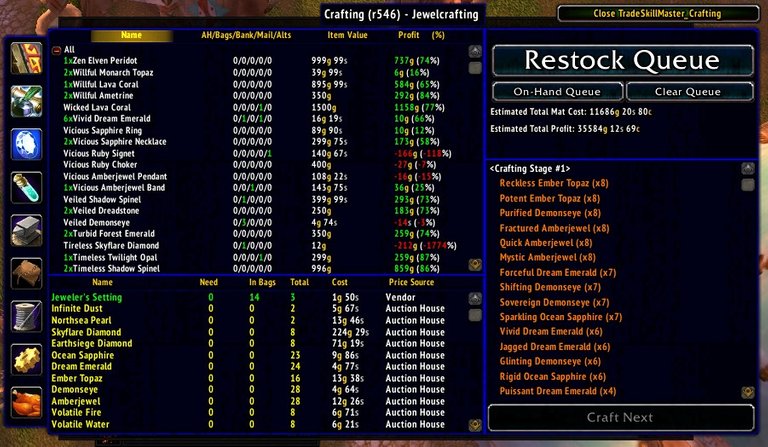
MODS (TSM: Trade Skill Master)
The ability to create custom mods on WOW is pretty impressive. I've spent many hours on TSM; Crafting things that other people need; Somewhat automating the process of listing items and whatnot. All in all I earned thousands of dollars worth of gold in WOW. As you can imagine that can take quite some time. Hundreds of hours if not more. I cashed out my "winnings" in 2016 in the form of my "Battle Net Balance" which I just recently used to buy the prerelease of D4 for "Free". Still have $170 left... so that hilarious. Good for another couple games.
The poor man's crypto
That's what a Battle.Net balance amounts to, and also the reason why WEB2 gaming is so lack-luster. Centralized companies like Blizzard are prone to regulatory capture just like every other company. They can't allow free-flowing money to move through their system without a banking license. On top of that, companies like Blizzard have a strict corporate policy of not allowing other people to profit from their games. This is quite standard especially for a big company. The idea is if someone else is turning a profit: this could have been the corporation's profit, and it needs to be stopped.
All these reasons and more make it quite obvious that WEB3 gaming will completely dwarf WEB2 in every way. WEB3 can't be regulated. All of the profit gets kicked out to the community because the community is the one that owns and runs the game in the first place. It's a circular economy, which is something we've never seen before. I'm a bit annoyed that we haven't made more progress in this area. Clearly we are still grinding up that hill to the tipping point. Once we get there the floodgates will open.
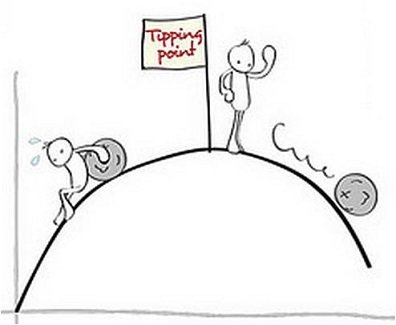
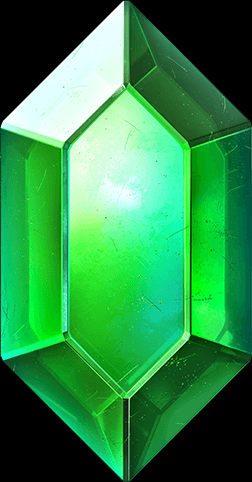
Currency Hyperinflation
The easiest way to kill any economy is with hyperinflation. This is quite easy to do in a video game because the stakes are lower and the creators of the economy are just some nerds planning out mechanics on a whiteboard and grinding out code. Hyperinflation occurs in many ways. The most classic way is with the in-game currency itself, which is normally gold or some derivative of it like gil or rupees in Zelda.
The problem with in-game currencies like this are the ease in which they are acquired and the lack of assets that you can actually trade for them. In many single player games you'll get to a point where the currency you farm becomes completely worthless because there is nothing left to buy whatsoever. Luckily in a single-player game this doesn't matter much because economics don't matter nearly as much when there is only one player. However, it's devastating when it happens in an MMO. Prices just keep going up and up from the flood of money and it never stops.
Gear Hyperinflation
Gear hyperinflation is arguably even worse than currency hyperinflation. This is what happened in Diablo 3 and I'm still salty about it to this day over a decade later. Once the best gear is randomly generated over and over again by thousands of players farming thousands of boss-drops: that gear never leaves circulation. Rather, every time you upgrade to something a little better you'll just sell your old gear to the next guy down the chain.
As time goes on this completely destroys the entire economy because it becomes nearly impossible to actually find relatively good gear on your own. It becomes much easier to simply buy good gear that you'd never be able to find on your own from the flooded market. This situation then becomes exponentially worse when the top players get bored and quit the game, dumping all their gear onto the already flooded market.
Interestingly enough this example of hyperinflation from the perspective of loot is actually deflation from the perspective of price to buy that loot. The market is flooded with supply and the price of gear goes down. Whether we call that inflation or deflation is completely dependent on our perspective. Buyers would call that deflation and sellers would call it inflation.
Noob-Zone Item Deflation
Another moderately interesting economic event that happened in WOW was the price of early-game materials skyrocketing in price. Imagine, if you will, the first wave of hardcore WOW players all racing to the endgame. Casual players are trickling in here or there scattered throughout the world, but there there's a good chunk of the guys who are playing 10+ hours a day grinding away in the highest level areas.
Some of these guys realized they raced to the end so fast that they skipped certain aspects of the game like leveling up their two trade-skills. Let's go with Tailoring & Enchanting, as that's what I'm personally most familiar with. No problem right? They'll just farm resources in the end game that are worth good money and trade that money to the noobs in the early game on the cheap.
So what ended up happening is that the price of cloth like linen and wool ended up getting jacked up to the moon. These were the starting resources one needed to level up tailoring and a lot of people were willing to pay a premium for them rather than heading back to the noob zones to farm them.
There were also be a few people who figured out interesting ways to farm these noob-items in mass using certain classes like mage-AOE spells inside low level 5 man dungeons as a solo max level with good gear (Scarlet Crusade farming), but for the most part farming noob-areas wasn't worth it for most people so the prices of these items stayed relatively high all the time.
The Sprint & Cutoff Point
If I recall correctly the cloth that came after wool was silk, and ironically silk was far more abundant and cheap than wool and linen. That's because the amount of time players would spend in that level range was much higher and you'd get a lot of silk simply leveling up your character. Whereas it was relatively easy to power-level quickly out of the noob zones and farm very little early-game resources. These dynamics led to those ironic situations where wool might be like 3 gold a stack but the "higher quality" material like silk would be 45 silver (0.45 gold) per stack.
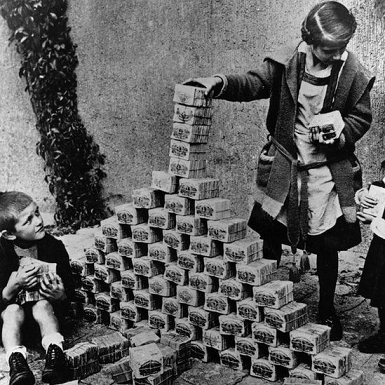
How do we stop hyperinflation & deflation?
Every once and a while I like to do theory-crafting on my own in-game economy and how I would go about handling these situations. Creating my own MMORPG is definitely an end-game goal of mine. Maybe within the next decade, friends. #dreambig
Gold Sinks
In order for currency to not hyperinflate it has to have value. This means that it needs to be useful for many things. However, even if you can use gold to buy things from other players, that money would not leave the economy and would continue to circulate through it. So not only does the money have to be useful, but it also has to exit the economy. We call these mechanics "gold sinks".
Many types of gold sinks have been employed in RPGs.
- Repairing durability on damaged or broken gear.
- Gear can lose durability from a combination of a few variables:
- Taking damage
- Dealing damage (weapon durability loss)
- Being killed (normally a huge durability penalty)
- Gear can lose durability from a combination of a few variables:
- Buying materials/gear/services from NPC vendors.
- This is often discouraged/nerfed as it can have adverse effects on other parts of the economy.
- Auction House (AH) fees.
- Listing fees (a flat fee in wow depending on time + gear-level)
- Selling fees (a percentage of the sale normally 5%)
- Buying permanent account upgrades like storage space in the bank.
NPC Analysis
As we can see in pretty much all cases in order to remove gold from the ecosystem the player must pay an NPC for a service, and because NPCs are not-players by definition: that gold then disappears from the ecosystem and will not be respent.
The "Fun" Factor
Now might be a good time to note that no matter how well the game economy is theory-crafted... none of that matters if the game itself is trash and nobody wants to actually play it. If the game itself isn't fun then there's no reason for players to interact with the economy in the first place. Traditionally, MMOs need a couple thousand players per server for these mechanics to actually work correctly.
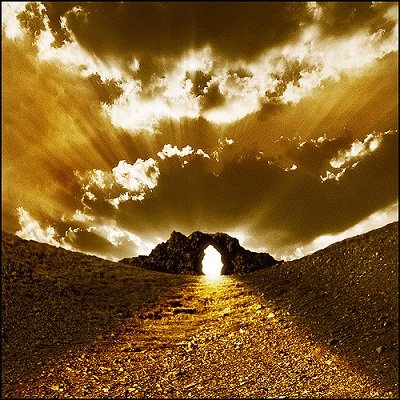
So what would I do differently?
That's the question, isn't it? For the most part I assume that I'm not in a position to reinvent the wheel and I understand that studying current theory likely has more value than trying to craft it myself. That being said: I do have some ideas that I'd like to put to paper, as they say.
Reduced Issuance
If you're like me then you've asked yourself questions like:
Why is this rabid grizzly bear carrying 25 gold pieces?
lol
But at the same time I already know why. It's all about creating game mechanics tailored to the hack-and-slash slot machine. The game would be boring if you killed something and nothing dropped. Even if it's something worth very little players feel a sense of progress when the event trigger happens. And thus we get situations like this where a pack of wolves will drop precious metals and/or armor even if that makes zero logical sense. It's all part of the slot-machine pull. Given enough pulls everyone's a winner sooner or later.
There are two ways which gold can be "created out of thin air" in games like WOW and Diablo IV.
- Dropped directly from mobs you've slain.
- Gear sold to NPCs for x price.
After thinking about this stuff for countless hours over decades of gaming... I'm starting to think that this type of issuance is completely ridiculous for a lot of reasons. The currency is derived simply from playing the game. Not only is that too easy, but it's also prone to exploitation from several attack vectors such as Sybil Attack (bots) and "Chinese Gold Farmers".

We all know that WEB3 is borderless.
If a decentralized WEB3 crypto game is created in which players can make $10 an hour... that is a significantly large sum of money to certain individuals. This should come as no surprise to Hive considering the various communities we have like Venezuela, Nigeria, Ghana, Cuba and more.
We'd have to expect many players would play simply to sell what they farm into the economy. This can be an annoyance to some because they feel like it devalues their own items by flooding the ecosystem with materials that otherwise wouldn't be there; driving the prices down and creating that dreaded item inflation we talked about before.
I believe the key to this issue is to set up the incentives of the game in such a way that mindlessly farming items is discouraged and actually playing the game how it's supposed to be played is encouraged.

It is for these reasons that I came to the conclusion that a resource like gold should NEVER drop unless there is some kind of risk involved in acquiring it. My first idea was for there to be some kind of algorithm that estimated how much danger the player was in based on their level vs the levels of the enemies they were in combat with. If that risk level did not meet a certain threshold: gold would not drop after winning the fight. No risk; no reward. Simple.
Alt path #1
After thinking about this more I've come to several alternate conclusions as well. For example: perhaps gold should be mined just like in real life and have nothing to do with killing mobs whatsoever. If gold costs a certain amount to mine and is worth a certain amount then this will reach equilibrium; meaning that hyperinflation would be impossible like other games.
The cost of mining could be a legitimate POW type scenario where the game creates blocks based on actual crypto mining. This would be an interesting way to do it because POW mining creates random numbers that are very difficult to hack... so in addition to mining the in-game currency it could also be used for all RNG within the game and players would not have to worry about the randomness of events being hacked.
Alt Path #2
Another interesting way of solving the currency problem is by not having gold at all and simply incorporating another crypto asset into the game that already exists. For example if the game was built on the Magitek network I want to build I could just program LIGHTNING into the game and even simply rename it to gold on the frontend. This would in turn increase demand for LIGHTNING which gets created by either destroying MANA gov tokens or native HBD on Hive.
It's important to remember that the only reason "gold" even exists in video games is because KYC/AML regulations prevent the free flow of "real" money. Otherwise USD would have been directly incorporated into games long ago.
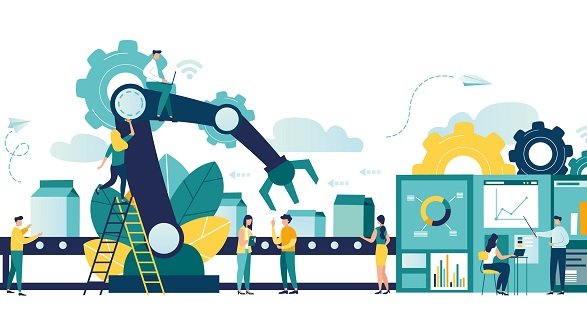
Crafting
In basically every RPG game I've played crafted gear was always sub-par gear meant for Twinking low level characters or leveling up through the early to mid game. A best-in-slot crafted item is practically unheard of. Personally I'd like to see a game where 100% of the gear was crafted using raw materials found from adventuring.
Perhaps you find a rare gem and craft it into a high powered ring, or find mythic dust that can be used to enchant a piece of leather armor. This might be a bit of an obtuse way of going about it but I really think that crafting things is an underutilized mechanic in gaming and would like to see more power going into the player's hands.
RNG
Random Number Generation is a huge problem within the context of WEB3 gaming. How does one go about this? If you build the project on Hive you might use the witness signature of the block said data is on, but then on a technical level any top 20 witness could theoretically cheat by manipulating the blocks they produce in their favor. Is this unlikely? Depends on how much there was to gain I suppose. Still, just the technical possibility of it is noteworthy.
As I've said previously the most critical RNG should simply employ POW RNG from the most secure chain. As we all know: this is Bitcoin hands down. As long as the thing being generated can wait 10 minutes without destroying the game UX this is a very simply and sleek solution. If this wasn't an option due to time constraints it's possible that multisig between multiple trusted parties determined the RNG (including the player in question so they know they aren't being cheated).
Binding
Binding items to accounts is one of the easiest ways to prevent item hyperinflation. There are many different kinds of binding. Once the item is bound, it can no longer be traded to another account and becomes locked out of the greater economy.
Types of binding
- Bind on Equip: if a player uses the item it becomes locked.
- Bind on Pickup: can never be sold on the market ever.
- Bind to Account: Item is account bound rather than character bound.
- Bind on mod: if the item is modified it becomes locked.
There are also other types of binding that I've ever even seen implemented before. For example an item might bind depending how much damage a player has done with it or how many times it has been repaired. The more ways items can exit the ecosystem like this the easier it is to prevent hyperinflation of assets.
Hardcore mode
If I build an RPG I want it to be hardcore mode. Hands down. I don't care what the noobs think about it. If you die you're dead forever. This is the ultimate everything-sink. Dead characters that lose everything they were holding is the ultimate way to stop assets from flooding the economy. This in combination with the idea that items will not drop unless you take risks would make the game extremely interesting and very difficult to bot.

Sybil Attack
The ultimate threat to any video game economy are bots that play the game automatically. With the rise of AI this is an even greater threat. How can we stop this from happening? Perhaps we can't, but we have to try, otherwise the economy will be gutted in short order with most of the value being leeched into the attacker's pocket.
The really interesting thing about WEB3 gaming is that players themselves are the GMs. No not good morning: Game Masters. Because the game servers and API are completely open and transparent, anyone can see what anyone is doing. Bounties could be set up to pay users to find bots and eliminate them. We don't have to rely on a centralized company to regulate the network. Everything is public domain.
I would even go so far as to say that some servers and game setups should be invite-only. This would make it extremely difficult to cheat as every single player would be vetted by the community as a real person. If anyone gets invited and starts cheating, the chance of them getting kicked and losing everything is high. That would hopefully be enough of a threat to prevent bad actors from invading the system. Of course the ability to kick people for "cheating" could be abused as a petty revenge tactic, so this also needs to be taken into account when designing the specific mechanics. 51% attacks are a big deal.
For example: imagine I invited 1000 users on Hive into my game server... or rather I invited like a couple dozen players I could trust and I asked them to do the same, each nomination with a vote that needs to pass. It sounds counterintuitive creating a permissioned system within a crypto ecosystem, but I actually think it could work out quite nicely to make sure value doesn't bleed out of the ecosystem.
Conclusion
Well I've created another ridiculously long gaming post.
I guess I have a lot to say about game economics.
I could easily go on for another 2000 words, but I'll spare you.
Needless to say I'm always thinking about the theory-craft behind MMO economics and how it relates to the real world. These games are a microcosm of real life and a lot can be learned from them. I hope one day to help build something that stands out from everything else in the WEB3 ecosystem. #dreambig
wen tokenomics advisor for us? 😎
That's what kind of made and makes Bitcoin the ultimate crypto while everything else is single run by a company or people who wont let go of it. Human greed to be in control. Some of the best platforms and games however are when the creator lets it free to the world and the community starts building on top of it. Hopefully we see that soon.
Makes sense that if you kill Elder Boar with a Simple Dagger, you will be able to extract its tusks, hide and meat and sell it later or use in crafting, but if you casually kill it with a swing of Soulreaper Sword of the Abyss, the boar turns into badly burned lump of minced meat and you get nothing.
That is a good idea. Many government agencies that manage game hunting allow bow hunters longer seasons and relaxed takes, because it's more difficult than rifle hunting. This suggests your idea is backed up by real world examples.
Thanks!
I only play Hardcore. Terraria, Minecraft, Path of Exile. I haven't respawned in at least 5 years.
Splinterlands' Tower Defense spin-off SoulKeep will be Hardcore. Every time you pass a wave, you're given the option to either retire, keeping your winnings, or press on, risking everything you've gained so far.
Congratulations @edicted! You have completed the following achievement on the Hive blockchain And have been rewarded with New badge(s)
Your next target is to reach 46000 upvotes.
You can view your badges on your board and compare yourself to others in the Ranking
If you no longer want to receive notifications, reply to this comment with the word
STOPTo support your work, I also upvoted your post!
Check out our last posts:
Support the HiveBuzz project. Vote for our proposal!
Great ideas. What about enabling in game banking services to be provided by players - or by interfacing with IRL banks/exchanges?
Thanks!